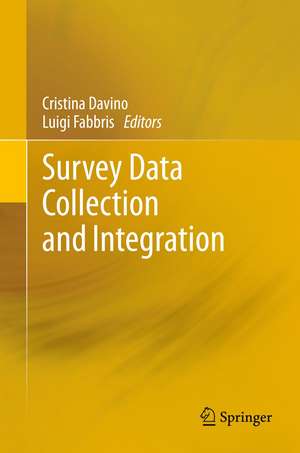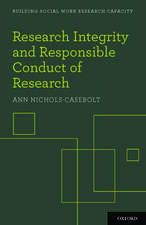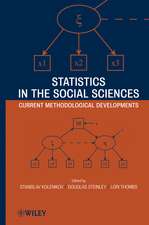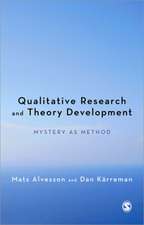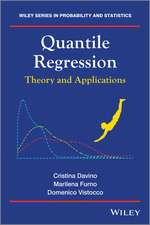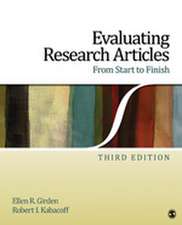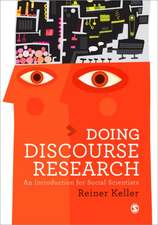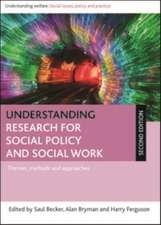Survey Data Collection and Integration
Editat de Cristina Davino, Luigi Fabbrisen Limba Engleză Paperback – 9 noi 2014
This book focuses on survey theory and applications, providing insight and innovative solutions to face problems in data collection and integration, complex sample design, opinion questionnaire design, and statistical estimation.
Formal rigour and simple language, together with real-life examples, will make the book suitable to both practitioners involved in applied research and to academics interested in scientific developments in the survey field.
| Toate formatele și edițiile | Preț | Express |
|---|---|---|
| Paperback (1) | 380.84 lei 6-8 săpt. | |
| Springer Berlin, Heidelberg – 9 noi 2014 | 380.84 lei 6-8 săpt. | |
| Hardback (1) | 385.84 lei 6-8 săpt. | |
| Springer Berlin, Heidelberg – 23 oct 2012 | 385.84 lei 6-8 săpt. |
Preț: 380.84 lei
Nou
Puncte Express: 571
Preț estimativ în valută:
72.88€ • 76.44$ • 60.67£
72.88€ • 76.44$ • 60.67£
Carte tipărită la comandă
Livrare economică 01-15 aprilie
Preluare comenzi: 021 569.72.76
Specificații
ISBN-13: 9783642429149
ISBN-10: 3642429149
Pagini: 168
Ilustrații: XII, 156 p.
Dimensiuni: 155 x 235 x 9 mm
Greutate: 0.25 kg
Ediția:2013
Editura: Springer Berlin, Heidelberg
Colecția Springer
Locul publicării:Berlin, Heidelberg, Germany
ISBN-10: 3642429149
Pagini: 168
Ilustrații: XII, 156 p.
Dimensiuni: 155 x 235 x 9 mm
Greutate: 0.25 kg
Ediția:2013
Editura: Springer Berlin, Heidelberg
Colecția Springer
Locul publicării:Berlin, Heidelberg, Germany
Public țintă
ResearchCuprins
Part 1: Introduction to Statistical Surveys: Critical Points, Challenges and Need for Development (Luigi Biggeri).- Part 2: Questionnaire Design: Measurement Scales for Scoring or Ranking Sets of Interrelated Items (Luigi Fabbris).- Assessing Multi‐Item Scales for Subjective Measurement (Cristina Davino and Rosaria Romano).- Statistical Tools in the Joint Analysis of Closed and Open‐Ended Questions (Simona Balbi and Nicole Triunfo).- The Use of Self‐Anchoring Scales in Social Research: The Cantril Scale for the Evaluation of Community Action Orientation (Immacolata Di Napoli and Caterina Arcidiacono).- Part 3: Sampling Design and Error Estimation: Small Area Estimation of Poverty Indicators ( Monica Pratesi, Caterina Giusti and Stefano Marchetti).- Non‐Sampling Errors in Household Surveys: The Bank of Italy’s Experience (Giovanni D’Alessio and Giuseppe Ilardi).- Part 4: Data Integration: Enriching a Large Scale Survey from a Representative Sample by Data Fusion: Models and Validation (Tomàs Aluja‐Banet, Josep Daunis‐i‐Estadella and Yan Hong Chen).- A Business Survey on Job Vacancies: Integration with Other Sources and Calibration (Diego Bellisai, Stefania Fivizzani and Marina Sorrentino).
Recenzii
From the book reviews:
“The book under review deals with problems that require practical solutions that either deviate from the traditional methodology or do not have a specific solution at all. The methodology described in this volume is very valuable as it provides additional statistical tools for generating data and extracting the necessary information. … The book Survey Data Collection and Integration is a valuable addition to the expanding repertoire of statistical methodology.” (C. R. Rao, Technometrics, Vol. 56 (1), January, 2014)
“The book under review deals with problems that require practical solutions that either deviate from the traditional methodology or do not have a specific solution at all. The methodology described in this volume is very valuable as it provides additional statistical tools for generating data and extracting the necessary information. … The book Survey Data Collection and Integration is a valuable addition to the expanding repertoire of statistical methodology.” (C. R. Rao, Technometrics, Vol. 56 (1), January, 2014)
Notă biografică
Cristina Davino is an associate professor of Statistics at the University of Macerata, Italy, and a member of the Doctoral Committee for the Ph.D. in Statistics at the University of Naples Federico II. Her research fields include: multidimensional data analysis, data mining (neural networks, association rules), quantile regression, statistical surveys, sensitivity analysis of composite indicators, evaluation of quality of life, and evaluation of educational planning.
Luigi Fabbris is a full professor in Social Statistics at the Statistics Department, the University of Padua, Italy, where he lectures in Survey Methodology and Social Statistics. His research fields are multivariate analysis, survey sampling and questionnaire design; he was also active in social indicators, nexuses between education and work, social conditions of women, immigrants, the elderly and the homeless.
Luigi Fabbris is a full professor in Social Statistics at the Statistics Department, the University of Padua, Italy, where he lectures in Survey Methodology and Social Statistics. His research fields are multivariate analysis, survey sampling and questionnaire design; he was also active in social indicators, nexuses between education and work, social conditions of women, immigrants, the elderly and the homeless.
Textul de pe ultima copertă
Statistical surveys represent an important source of scientific knowledge and a valid decision support tool in many fields, from social studies to economics, market research, health studies, and others. Scientists have tackled most of the methodological issues concerning surveys and the scientific literature offers excellent proposals for planning and conducting surveys. Nevertheless, surveys often require the achievement of aims that either deviate from the methodology or do not have a specific solution at all.
This book focuses on survey theory and applications, providing insight and innovative solutions to face problems in data collection and integration, complex sample design, opinion questionnaire design, and statistical estimation.
Formal rigour and simple language, together with real-life examples, will make the book suitable to both practitioners involved in applied research and to academics interested in scientific developments in the survey field.
This book focuses on survey theory and applications, providing insight and innovative solutions to face problems in data collection and integration, complex sample design, opinion questionnaire design, and statistical estimation.
Formal rigour and simple language, together with real-life examples, will make the book suitable to both practitioners involved in applied research and to academics interested in scientific developments in the survey field.
Caracteristici
Directed both to Academic applied researchers and practitioners Includes recent developments in survey theory and application Focuses on survey theory and applications Offers excellent proposals for planning and conducting surveys Includes supplementary material: sn.pub/extras
